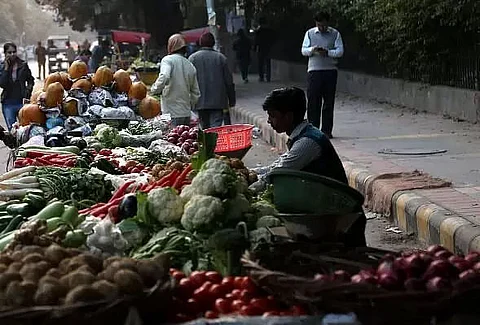
- Home
- Live Blog
- Breaking News
- Top Headlines
- Cities
- NE News
- Sentinel Media
- Sports
- Education
- Jobs

Daily business activities and many service sectors in Guwahati city virtually came to a standstill over the past weekend, with petty traders and service sector employees mostly from settlements of immigrants belonging to religious minorities leaving for Eid celebration, an ominous sign of a host of economic activities slipping out of indigenous communities. Overdependence of the capital city—the commercial hub for the entire northeast region—on immigrant settlers also exposes the vulnerabilities of the entire state economy. The emerging situation is the result of Assamese and indigenous communities creating the vacuum by staying away from such economic activities, which immigrant settlers filled in. Ironically, petty trades such as vending fish, fruits, eggs, vegetables, etc., or the services of plumbers, electricians, masons, and construction workers do not require any special skill training or big capital and only require motivation to become economically self-reliant. The indifference of organisations claiming to champion the cause of indigenous communities to the ground realities of immigrant settlers gradually eclipsing the lower echelons of the state economy has made the situation more precarious. The prevalent situation has held up a mirror to the Assamese and other indigenous communities as to how the slogan Pothar Amar, Bozar Amar (Farm fields belong to us, markets also belong to us) often raised by some of these organisations has been reduced to mere rhetoric. With the rapid vertical and horizontal growth of the city, the avenues of livelihood have also grown faster. The city needs more supply of vegetables, fish, eggs, fruits, and other food items to meet the growing demand of the increasing resident population as well as the floating population of daily visitors from nearby towns and other parts of the state and region. The growth of the real estate business and infrastructure development, such as the construction of roads, flyovers, parks, storm water drainage systems, etc., have triggered tremendous demand for construction workers. With the volume of municipal waste also increasing manifold, demand for contractual municipal workers for municipal waste management in the city has also grown significantly. Youth belonging to indigenous communities are reluctant to take up such work and rather prefer becoming migrant workers in cities and towns outside the northeast region to work as security guards, unskilled workers, or daily wage earners far away from their villages. The demand for petty traders, construction workers, and various service workers is met with supplies of cheap workers from settlements of immigrants from erstwhile East Bengal, East Pakistan, or illegal migrants from Bangladesh. As the publication of the final list of the National Register of Citizens free from names of illegal Bangladeshi migrants and the implementation of the Assam Accord have been put on hold, there is no mechanism for the city residents to ascertain if such workers hired or engaged by them include illegal Bangladeshis. Such possibilities increase the vulnerability of the internal security of not just the capital city but also of the state and the region, which authorities have failed to take note of. Immigrant settlers have increased their economic capital by seizing all the opportunities for income-generating avenues in the city, which has also helped the community build resilience against economic shocks arising from crop failure or crop loss due to floods and erosion. Vendors belonging to indigenous communities account for a negligible percentage, while most farmers among them wait for traders to buy their produce at their doorstep or at the nearest weekly market. In the absence of cold storage and other storage facilities, the indigenous farmers are unable to negotiate a remunerative price, and such distress selling erodes their economic capital and makes them vulnerable to economic shocks. In sharp contrast, a large section of farmers and fishermen among immigrant settlers double up as traders and transport their produce to Guwahati markets from faraway places in a bid to get remunerative prices. Some young farmers also migrate to the city in between two farming seasons to work as construction workers or daily wage earners, while thousands of youth belonging to indigenous communities would be seen standing in long queues outside the various venues of examination for a few government jobs. Educated youth, with the exception of a few, in many villages of indigenous communities are seen passing time without engagement in economic activities and indulging in unproductive expenditure of the hard-earned money of their parents by buying fuel for riding motorbikes instead of turning those personal mobility solutions into augmenting household income. It is high time the youth of indigenous communities realised the importance of economic self-reliance and seized vast opportunities for income and livelihood avenues in the city as construction workers, traders, service providers, and ever-expanding markets for farm produce. It will help them kill two birds with one stone: enhancing the economic capital of their communities and ending the dominance of immigrant settlers in the lower echelons of the state economy. Public sector undertakings such as Oil India Limited, Numaligarh Refinery Limited, Indian Oil Corporation, etc., holding awareness and training camps for youths belonging to indigenous communities on opportunities in trade and commerce as well as in service sectors in the state will go a long way in motivating them.
Also Watch: